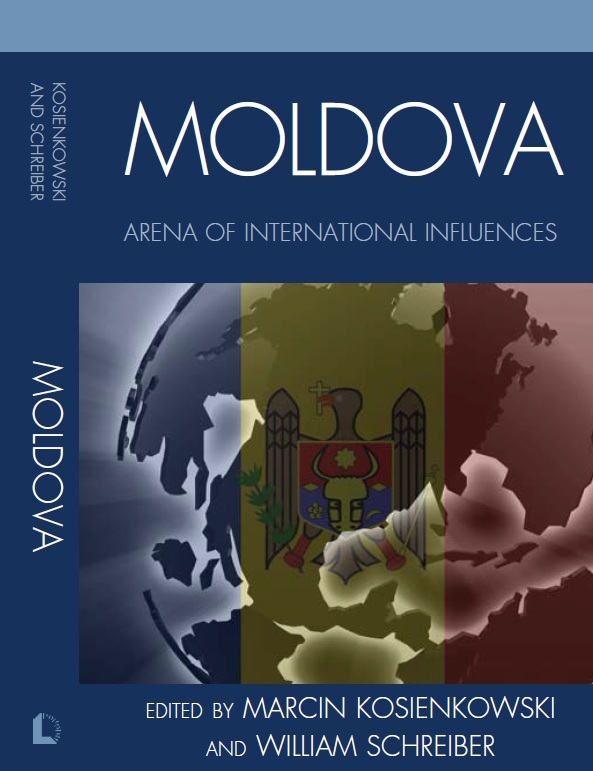Audit of International Actors’ Policies Towards Moldova
November 29, 2012 -
Stanislav Secrieru
-
Bez kategorii

Cover Kosienkowski Schreiber.jpg
A review of Moldova: Arena of International Influences edited by Marcin Kosienkowski and William Schreiber.
I read Moldova: Arena of International Influences, a book on Moldova co-edited by Marcin Kosienkowski and William Schreiber with great interest. It has, in my opinion, two major merits. Firstly, the book makes an empirical contribution to the study of small states, an understudied theme in international relations due to a Cold War inertia of focusing primarily on systemic actors. Moldova is small not only in size, but also in terms of its capabilities. The fragility of its political and economic systems, coupled with the Transnistrian conflict, significantly reduces Moldova's capacity to shape its regional environment.
Therefore, Moldova is simply compelled to navigate between the middle and great powers that populate its vicinity. It also has to look increasingly far beyond the European horizon, to bolster its chances for survival and economic development. For example, Moldova recently attuned its economic diplomacy in an effort to secure the repeal of the Jackson-Vanik Amendment and capture a segment of the rapidly growing Chinese wine market. As Moldova is extremely exposed to international influences, this book adopts a top-down perspective in studying small states and uncovering policies of minor or major stakeholders (18 in total) towards Moldova.
It also presents examples of how small vigorous states, still vulnerable, but much better off since joining the European Union and NATO, project influence aimed at solidifying their small weak state. In addition, the book includes the non-recognised political entity of Transnistria’s perspective on Moldova. What is missing here from the complete picture is a reversal of this focus, namely how Moldova reacted to an environment fostered by actors deemed vital to the success of its statehood project.
Secondly, until recently, Moldova has been rarely noticed by international relations scholars in comparison to its post-Soviet neighbours, such as Ukraine, Belarus and the South Caucasian republics, which received a fair amount of attention. Moldova could hardly compete in terms of research subjects with the geopolitical value of Ukraine for the success of Russia’s re-imperialisation endeavour in the post-Soviet world, the significance of Belarus and Ukraine for Europe’s energy security, or the oil and gas rush in South Caucasus. If Moldova received exposure, it was mainly because of the Transnistrian conflict. This status quo gradually changed after the post-electoral turmoil in April 2009.
Moldova emerged as an interesting case for democratisation and Europeanisation studies. The re-launch of the “5+2” talks on Transnistria and Chisinau’s policy of small steps reintroduced Moldova back into the “protracted conflicts” research agenda. Seen in this perspective, the book is a timely publication which meets the demand for more knowledge about Moldova and how other actors relate towards Moldova. Importantly, along with traditionally strong players in Moldova, like Russia or the EU, the book unveils the outlook of two rising powers, China and Turkey, who have boosted their profile in Moldova and across the region.
What this book lacks, however, is a concluding chapter that would put the empirical analysis into a comparative perspective, identifying similarities and differences in the evolution of policies, objectives and the implementation of states’ approaches toward Moldova. For instance, policies of the Central European states on Moldova before and after joining Euro-Atlantic institutions beg for such a comparative exercise. It would also be useful to apply a comparative perspective to the evolution of Russian, European and Turkish neighbourhood policy towards Moldova.
All in all, the editors should be congratulated for the idea to realise the first comprehensive audit of international actors’ policies towards Moldova. It is a timely and useful publication which will hopefully spearhead multifaceted research of Moldova’s post-Soviet endeavour to find its place in the rapidly changing international order.
Stanislav Secrieru holds PhD in Political Sciences (SNSPA). He has conducted research at the NATO Defense College (Rome), the Institute for European Politics (Berlin) and the New Europe College (Bucharest). He has been involved in research projects at the European Council on Foreign Relations (London), the DemosEuropa (Warsaw), the Europeum (Prague), the Heinrich Böll Foundation (Berlin), the Open Society Foundation (Bucharest) and the Finnish Institute for International Affairs (Helsinki).



































